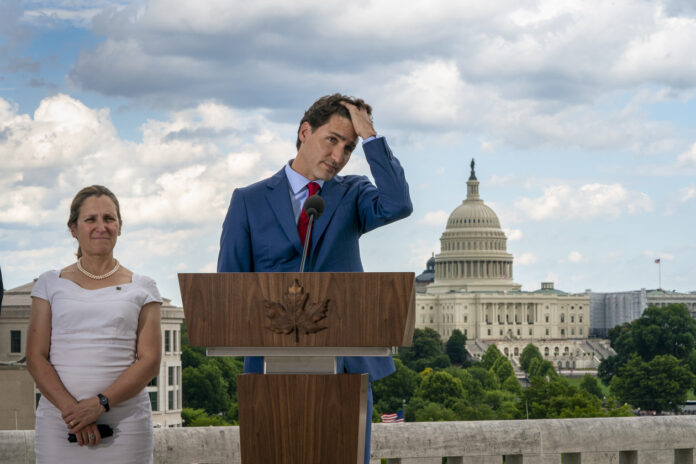Chrystia Freeland of Canada has become the first casualty of President-elect Donald Trump’s tariff war.
“The Great State of Canada is stunned as the Finance Minister resigns, or was fired, from her position by Governor Justin Trudeau,” Trump said on Truth Social late Monday night. “Her behavior was completely toxic and unsuitable for reaching agreements that would benefit Canada’s dissatisfied population. She will not be forgotten!!!!”
Freeland abruptly exited Trudeau’s Cabinet on Monday, citing disagreements with Trudeau over economic policies and Trump’s trade threats. In her resignation letter, she warned that Canada’s response to Trump “will define us for a generation, and perhaps longer.”
The shocking statement ended Freeland’s tenure as deputy prime minister and Trudeau’s trusted right hand, particularly during the first Trump administration, when the president reopened continental trade discussions, which constituted a significant danger to the Canadian economy.
Six years later, Trump has drove the leaders apart by threatening to put 25% tariffs on Canadian products.
Last month, Freeland was curiously absent when Trump hosted Trudeau for dinner at Mar-a-Lago. Instead, the prime minister flew to Florida on November 29 to meet with his old friend and confidant, Canadian Public Safety Minister Dominic LeBlanc.
Freeland dismissed her absence as jurisdictional; the border falls within LeBlanc’s purview, thus he was more prepared to dine with Trump’s staff. During Trump’s first presidency, however, Freeland was at the forefront as the political leader of the Canadian team renegotiating NAFTA.
That job made her a target, even when she hosted a handmade supper for trade czar Robert Lighthizer at her Toronto home. Trump openly criticized her negotiating technique. “We don’t like their representative very much,” he added at the time.
In Monday’s letter, Freeland emphasized disagreements with Trudeau on economic strategy and Trump’s trade threats. Meanwhile, LeBlanc accepted Trudeau’s fresh invitation to serve as finance minister, succeeding Freeland. She accused Trudeau of tying one hand behind her back when it came to spending that might help Canada’s position with Trump.
Monday’s resignation will not mark the end of Freeland’s decade-long political career, which followed several decades as a journalist, during which she covered the demise of the Soviet Union. For the time being, she will continue to serve as an MP in a seat on the government’s backbench, far behind Trudeau but with the possibility of running for his position in the future.
Trump’s recent threats have contributed to the Liberals’ domestic concerns.
Trudeau wanted to spend money on a temporary two-month holiday tax break to win back working-class Canadians battered by rising prices and a stagnant economy as his party’s poll numbers plummet; Freeland says she wanted to increase spending on border and security issues to appease Trump’s criticism.
In her farewell statement, she cited “costly political gimmicks” imposed on her as finance minister, which lost the country of “the reserves we may need for a coming tariff war.” Trump has threatened to put tariffs on Canada and Mexico if they do not stop the flow of illegal narcotics and migrants across their American borders.
Freeland and Trump have a contentious history. During Trump’s first term, she frequently criticized his protectionist policies and disdain toward global institutions, particularly during the tumultuous NAFTA renegotiation process.
When Trump’s son-in-law attacked Freeland’s negotiation technique two years ago, she escalated the situation by referring to the previous president as a “bully.” Freeland was responding to broadsides in Jared Kushner’s memoir, and her counterpunch came at a time when Trump was widely regarded as a distant memory.
Now the tables have turned, and Trump is threatening steep tariffs, not to mention retaliation against a long list of perceived or real opponents.
On Monday morning, Freeland announced her resignation only hours before she was supposed to address Parliament with a major report on the status of the Canadian economy.
In her letter, Freeland did not back down from her previous criticism of Trump’s protectionist policies.
“Our country is currently facing a tremendous problem. The incoming administration in the United States is adopting a strong economic nationalism strategy, which includes the threat of 25% tariffs,” Freeland stated.
“That means pushing back against ‘America First’ economic nationalism with a determined effort to fight for capital and investment and the jobs they bring.”
LeBlanc, the New Brunswick-born son of a former Canadian governor general, acted quickly following his hastily scheduled swearing-in to exude calm reassurance in the aftermath of a turbulent day that saw repeated calls for Trudeau’s resignation.
“I had interesting conversations today with officials in the incoming administration in the United States on border security,” LeBlanc stated before mentioning Trump’s candidate for Commerce Secretary, Howard Lutnick.
He dismissed the premise that Trump was likely tasting blood in the water following the events of the day in Ottawa.
“I’ve continued to have discussions with incoming secretary Lutnick for example, the commerce secretary around border security (and) was involved in meetings with senior officials in the incoming administration today,” according to LeBlanc.
“I saw two leaders focused on these issues at Mar-a-Lago.”
